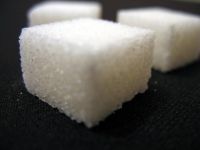It's official: sugar is mighty addictive
 |
A new study out of Princeton rounds out the notion that sugar is as addictive as many psychoactive substances. I'd thought this had already been amply demonstrated (remember the headlines about sugar being more addictive than cocaine?), but apparently there were some missing pieces to the puzzle that have now been illuminated:
Professor Bart Hoebel and his team in the Department of Psychology and the Princeton Neuroscience Institute have been studying signs of sugar addiction in rats for years. Until now, the rats under study have met two of the three elements of addiction. They have demonstrated a behavioral pattern of increased intake and then showed signs of withdrawal. His current experiments captured craving and relapse to complete the picture.
"If bingeing on sugar is really a form of addiction, there should be long-lasting effects in the brains of sugar addicts," Hoebel said. "Craving and relapse are critical components of addiction, and we have been able to demonstrate these behaviors in sugar-bingeing rats in a number of ways."
Rats that have been conditioned to be heavily dependent on sugar show interesting changes in the brain, including what appear to be "gateway" behaviors toward other drugs:
Hoebel has shown that rats eating large amounts of sugar when hungry, a phenomenon he describes as sugar-bingeing, undergo neurochemical changes in the brain that appear to mimic those produced by substances of abuse, including cocaine, morphine and nicotine. Sugar induces behavioral changes, too. "In certain models, sugar-bingeing causes long-lasting effects in the brain and increases the inclination to take other drugs of abuse, such as alcohol," Hoebel said.
Hoebel is hoping to continue this research toward a better understanding of eating disorders:
"It seems possible that the brain adaptations and behavioral signs seen in rats may occur in some individuals with binge-eating disorder or bulimia," Hoebel said. "Our work provides links between the traditionally defined substance-use disorders, such as drug addiction, and the development of abnormal desires for natural substances. This knowledge might help us to devise new ways of diagnosing and treating addictions in people."
|

Recently @ DoseNation
|
|





















